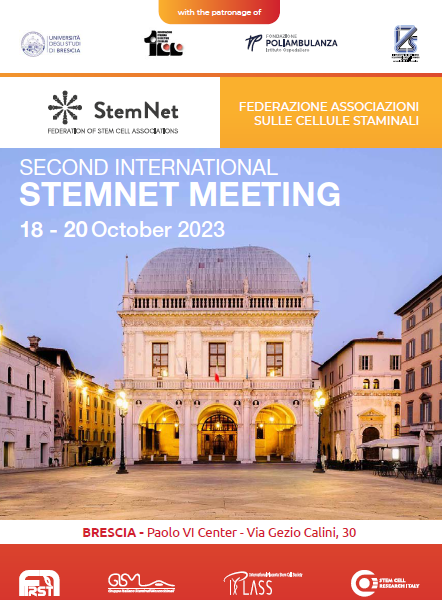Second International StemNet Meeting
This meeting is organized by
StemNet, the federation of the four main associations of stem cell research in Italy (FIRST, GISM, IPLASS, SCRI) that share and experiences to enhance both the quality and the impact of research in this advancing field.
Check the full program here
StemNet functions as a consortium comprising Italy’s four major stem cell research associations (FIRST, GISM, IPLASS, SCRI). This collaborative initiative serves to combine their expertise, aiming to enhance the caliber and impact of research in the rapidly evolving field of stem cells.
This assembly underscores the mutually beneficial relationship among these associations and strives to facilitate the exchange of pertinent, up-to-date insights within the realm of advanced cell therapy. Spanning nine sessions, the event will cast a spotlight on notable advancements in basic and translational stem cell research in both human and veterinary medicine.
The agenda also encompasses discourse on pivotal aspects of biomedical communication and the valorization of research, featuring a dedicated “next generation session” led by emerging scientists. A roster of esteemed national and international experts will engender dynamic debates throughout the engaging scientific program.
The venue, the Paolo VI Center within the historical Santangelo palace, is the result of merging two palatial structures from the 1600s, subsequently named after Brescian Pope Paul VI, canonized as a saint in 2014.
Join us in Brescia, which, along with Bergamo, has been designated as the Italian capitals of culture for 2023.
EVENT HIGHLIGHT
TALKS & SESSIONS
2.3 Session 3: “New technologies for 3D culture systems”
Tuesday 10 October, 16:30 CEST
During this session, Silvia Scaglione will deliver a presentation focusing on her groundbreaking work utilizing a novel Multi-In Vivo Organ (MIVO) on a chip platform. The talk will shed light on how this innovative platform holds the potential to revolutionize drug testing within cancer models.
The presentation will delve into the specifics of the models employed, including a 3D ovarian model that was developed and treated with Cisplatin. Furthermore, Scaglione will discuss the application of a 3D neuroblastoma cancer model, which was thoughtfully cocultured with immune cells. Through these outcomes, she has successfully established pertinent disease models as valuable tools to explore the intricate interplay between healthy and pathogenic cells. Additionally, they offer a versatile platform for drug screening purposes. This presentation promises to provide a comprehensive understanding of the potential impact of MIVO technology on cancer research and drug development.
Support
Want to come and meet us while at this event?
Keep in touch with our team and we will arrange a meeting!
Other News
February 21, 2025
Mac4Me Project: Macrophage Targets for Metastatic Treatment
January 20, 2025



